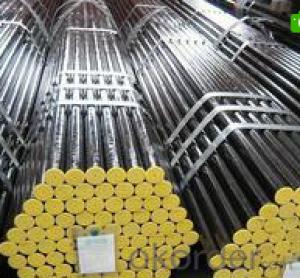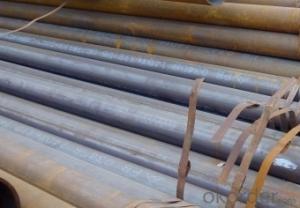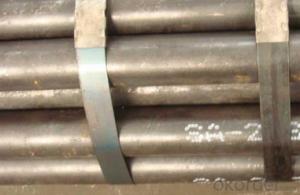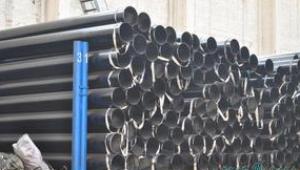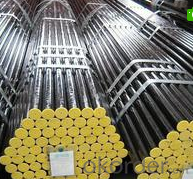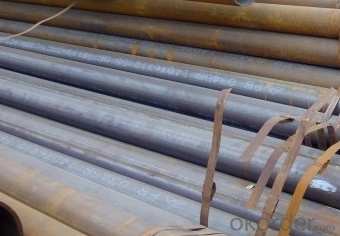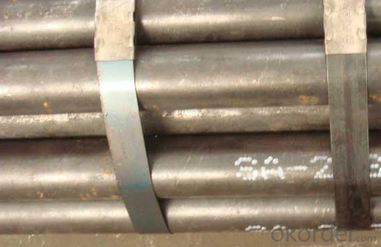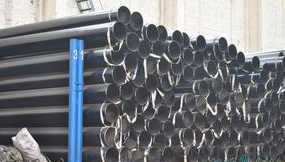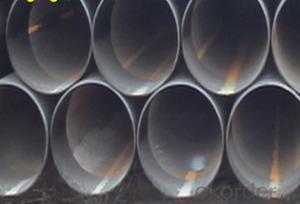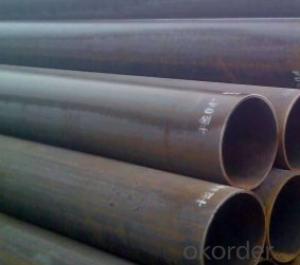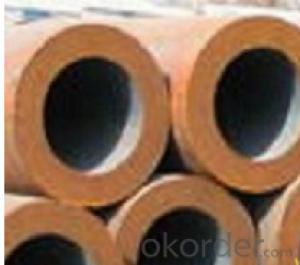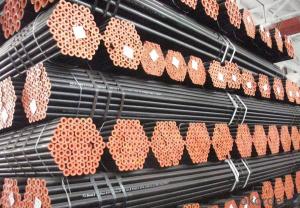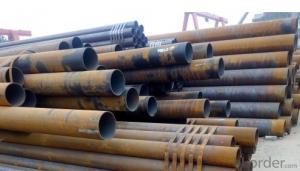Schedule 40 ASTM A53 API 5L GR.B Carbon Seamless Steel Tubes A335P91 CNBM
- Loading Port:
- Qingdao
- Payment Terms:
- TT OR LC
- Min Order Qty:
- 10 pc
- Supply Capability:
- 30 pc/month
OKorder Service Pledge
OKorder Financial Service
You Might Also Like
Quick Details
| Thickness: | 2.0 - 85 mm | Section Shape: | Round | Outer Diameter: | 17 - 914.4 mm |
| Secondary Or Not: | Non-secondary | Application: | Oil Pipe | ||
| Technique: | Hot Rolled | Certification: | API | Surface Treatment: | VARNISH PAITING |
| Special Pipe: | API Pipe | Alloy Or Not: | Non-alloy | END: | PLAIN,BEVELED OR THREADED |
| Grade: | 10#,20#,16Mn,A106(B,C),A210,A335 P5,A335 P91,A53(A,B),API J55,API K55,Q195,Q235,Q345,St37,St52,10#-45#,A53-A369,API J55-API P110,Q195-Q345,ST35-ST52 | Standard: | API 5CT,API 5L,ASME B36.19M-2004,ASTM A106-2006,ASTM A179-1990,ASTM A182-2001,ASTM A53-2007,BS 1387,DIN 1629/3,DIN EN 10216-1-2004,GB 5310-1995,GB/T 3091-2001,GB/T 8162-1999,GB/T 8163-1999,JIS G3454-2007,API,ASTM,BS,DIN,GB,JIS |
Packaging & Delivery
| Packaging Detail: | standard packing suitable shipping by sea.fixed length as customers' requirements, or SRL or DRL. Varnish, painting or galvanized, or FBE ,2PE,3PE 3pp coating,bevelled/plain/threaded ends with caps, packing in bundle (OD smaller than 141.3mm) big sizes packing in loose, marking as required. Shipped by sea,by air,by train . or some samples shipped by DHL,EMS,TNT,FEDEX ect. Length shorter than 5.85m should be shipped by 20' container, 5.85-12m shipped by 40' container. |
| Delivery Detail: | 7-35 days after advance payment |
Product Description
Seamless steel pipes, a large number of used pipes conveying fluids, such as transport oil, natural gas, gas, water pipes and some solid materials, and so on. Compared to other steel and solid steel bar, the same torsional strength in bending, lighter, is an economic cross-section steel, widely used in the manufacture of structural parts and mechanical parts, such as drill pipe, automotive drive shafts, bicycle rack and construction using steel scaffolding ring with steel pipe manufacturing parts, can improve material utilization, simplify the manufacturing process, saving material and machining time, such as bearing rings, jack sets, has been widely used to manufacture steel. Steel or a variety of conventional weapons indispensable material, gun barrels to make steel. Steel shapes in different cross-sectional area can be divided into tube and shaped tubes. As in the perimeter of equal conditions, the largest area of a circle with a circular tube can carry more fluid. In addition, the circular cross section to withstand internal or external radial pressure, the force is uniform, so the vast majority of the pipe is pipe.
- Q: What is the purpose of a steel pipe coating?
- The objective of applying a coating to a steel pipe is to safeguard it against corrosion and other environmental elements that may cause deterioration. By coating the pipe with a layer of material, a barrier is created between the steel and its surroundings, thereby averting direct contact and reducing the risk of corrosion. This is particularly crucial for pipes utilized in industries such as oil and gas, water distribution, and construction, where they encounter harsh conditions like moisture, chemicals, and extreme temperatures. Moreover, the coating improves the pipe's durability and longevity, guaranteeing its ability to withstand the demands of its intended use. In certain cases, specific types of pipe coatings can also possess insulation properties, which are valuable in applications where precise temperature control is essential to prevent heat loss or transfer. All in all, the primary purpose of a steel pipe coating is to safeguard the pipe, prolong its lifespan, and ensure optimal performance across various industries and environments.
- Q: Can steel pipes be used for underground cable conduits?
- Yes, steel pipes can be used for underground cable conduits. Steel pipes have high strength and durability, making them suitable for protecting and housing cables underground. They provide excellent protection against external elements and can withstand a wide range of environmental conditions. Additionally, steel pipes offer good resistance to corrosion, ensuring the longevity of the cable conduit system.
- Q: What are the lengths of scaffold steel tubes?
- Scaffolding steel pipe standard length is 6 meters, for easy use, respectively, 6 meters, 3 meters, 2 meters, 1.5 meters, 1 meters, etc., if there is a special length, you need to intercept.
- Q: How do steel pipes compare to other materials like PVC or copper?
- Steel pipes are known for their exceptional strength and durability, making them suitable for various applications. Compared to materials like PVC or copper, steel pipes offer higher resistance to corrosion, fire, and extreme temperatures. They also have a longer lifespan and can withstand high pressure and heavy loads. However, steel pipes are generally more expensive and require regular maintenance to prevent rusting. PVC pipes, on the other hand, are more affordable, lightweight, and easy to install, but they are less durable and have lower temperature resistance. Copper pipes are known for their excellent heat conductivity and resistance to corrosion, but they are more expensive and can be prone to theft. Ultimately, the choice between steel, PVC, or copper pipes depends on the specific requirements of the project and the budget.
- Q: Can steel pipes be used for electrical conduits?
- No, steel pipes are not suitable for use as electrical conduits. Electrical conduits are typically made of materials such as PVC (polyvinyl chloride) or metal conduits specifically designed for electrical applications.
- Q: What is the difference between cast iron and steel pipes?
- The main difference between cast iron and steel pipes lies in their composition and manufacturing process. Cast iron pipes are made from a strong, durable material that consists primarily of iron, carbon, and silicon. They are cast in molds and have a thick, heavy wall. Steel pipes, on the other hand, are made from an alloy of iron and carbon, usually with smaller amounts of other elements. They are manufactured using various methods, such as seamless or welded, and can have different wall thicknesses depending on their intended use. In summary, cast iron pipes are heavier and more brittle, while steel pipes are lighter and more flexible, making them suitable for different applications.
- Q: How do steel pipes handle seismic expansion joints?
- Steel pipes handle seismic expansion joints by allowing for movement and flexibility. These pipes are designed to withstand the forces caused by seismic activity, such as earthquakes, by accommodating expansion and contraction without causing damage to the overall structure. The joints in steel pipes are often equipped with specialized components, such as bellows or flexible couplings, that can absorb the movement and prevent excessive stress on the pipeline. This ensures the integrity and safety of the pipeline system during seismic events.
- Q: How do you calculate the flow rate of water in steel pipes?
- To calculate the flow rate of water in steel pipes, you need to know the pipe diameter, length, and the pressure difference between the inlet and outlet. By using the Darcy-Weisbach equation or other relevant hydraulic formulas, you can determine the flow rate based on these parameters.
- Q: How are steel pipes classified according to their use?
- Steel pipes can be classified according to their use into various categories such as structural pipes, plumbing pipes, oil and gas pipes, water supply pipes, and industrial pipes.
- Q: Can steel pipes be used for heat exchangers?
- Yes, steel pipes can be used for heat exchangers. Steel pipes are often preferred for heat exchangers due to their high thermal conductivity, durability, and resistance to corrosion. They are commonly used in various industries including power generation, chemical processing, and HVAC systems.
Send your message to us
Schedule 40 ASTM A53 API 5L GR.B Carbon Seamless Steel Tubes A335P91 CNBM
- Loading Port:
- Qingdao
- Payment Terms:
- TT OR LC
- Min Order Qty:
- 10 pc
- Supply Capability:
- 30 pc/month
OKorder Service Pledge
OKorder Financial Service
Similar products
Hot products
Hot Searches
Related keywords
